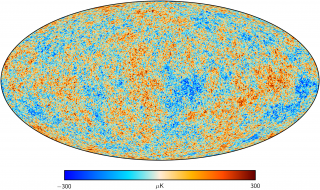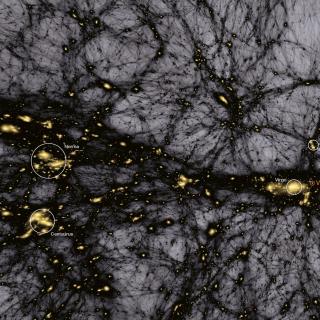Bibcode
Aricò, Giovanni; Angulo, Raul E.; Zennaro, Matteo; Contreras, Sergio; Chen, Angela; Hernández-Monteagudo, Carlos
Referencia bibliográfica
Astronomy and Astrophysics
Fecha de publicación:
10
2023
Revista
Número de citas
88
Número de citas referidas
72
Descripción
We present the first analysis of cosmic shear measured in DES Y3 that employs the entire range of angular scales in the data. To achieve this, we built upon recent advances in the theoretical modelling of weak lensing provided by a combination of N-body simulations, physical models of baryonic processes, and neural networks. Specifically, we used BACCOemu to model the linear and non-linear matter power spectrum including baryonic physics, allowing us to robustly exploit scales smaller than those used by the DES Collaboration. We show that the additional data produce cosmological parameters that are tighter but consistent with those obtained from larger scales, while also constraining the distribution of baryons. In particular, we measured the mass scale at which haloes have lost half of their gas, log Mc = 14.38−0.56+0.60 log(h−1 M⊙), and a parameter that quantifies the weighted amplitudes of the present-day matter inhomogeneities, S8 = 0.799−0.015+0.023. Our constraint on S8 is statistically compatible with that inferred from the Planck satellite data at the 0.9σ level. We find instead a 1.4σ shift in comparison to that from the official DES Y3 cosmic shear, because of different choices in the modelling of intrinsic alignment, non-linearities, baryons, and lensing shear ratios. We conclude that small scales in cosmic shear data contain valuable astrophysical and cosmological information and thus should be included in standard analyses.
Proyectos relacionados

Anisotropía del Fondo Cósmico de Microondas
El objetivo general de este proyecto es determinar y estudiar las variaciones espaciales y espectrales en la temperatura del Fondo Cósmico de Microondas y en su Polarización en un amplio rango de escalas angulares que van desde pocos minutos de arco hasta varios grados. Las fluctuaciones primordiales en la densidad de materia, que dieron origen a
Rafael
Rebolo López

Cosmología con Trazadores de la Estructura a Gran Escala del Universo
El Fondo Cósmico de Microondas (FCM) contiene la información estadística de las semillas primigenias que han dado lugar a la formación de todas las estructuras en el Universo. Su contrapartida natural en el Universo local es la distribución de las galaxias que surgen como resultado del crecimiento gravitatorio de aquellas fluctuaciones de densidad
FRANCISCO SHU
KITAURA JOYANES